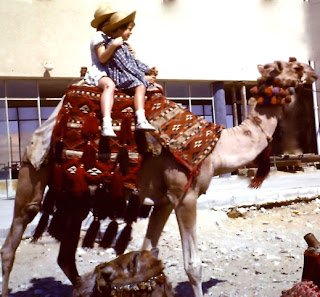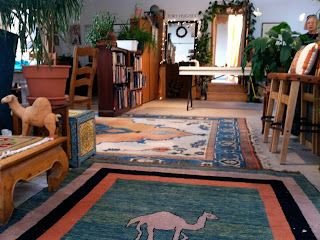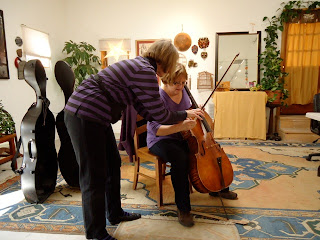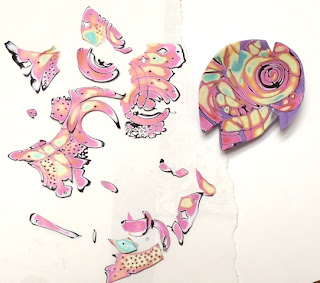Where were
you born?
Roanoke, Virginia- in a hospital
that has a star outlined in lights on its roof!
I only lived there for 2 years
though. My father was a corporate executive with GE, so we were transferred
across the globe every two to three years.
I’d been around the world three
times by my tenth birthday, and had a collection of those pins with the wings
on them that you used to get as a kiddie flyer. Maybe that explains my very
early love of flying and jewellery, of a nomadic existence and the artefacts
and culture I can create from this love.
What was it
like growing up over there?
I liked it a lot, that's for
sure.
I’ve always been very engaged by
direct experience. There are such a variety of ways to be human. The cultural
and ecological differences that result from living and adapting to different
locations enriched my life from the beginning.
I also learned early on, and
irrevocably, there is no one way to do anything, but instead a myriad of
approaches based on the situation and each person’s goals and intention.
Which leads right to the first picture from my
studio: and a similar theme already emerges. The rug has a camel woven
into in the middle of it.
Another one of the many benefits
of growing up travelling all over the world was that I was shown to a vast
collection of objects, ideas, materials, visual design, architecture,
machinery, art, textiles, everything humans have ever made for any reason!
Everywhere we lived or travelled to, there were lots of museums: and we went to
as many as we could. My parents were curious, intelligent people who always
wanted to know and see more, wherever we were. So I was familiar with the
omnipresent Roman ruins in Europe and why they are everywhere, the silk
textiles in the far East that were developed to deal with that area's heat and
humidity, and on and on.
What kind of
study did you take?
I went to a liberal arts college,
Smith College in Massachusetts. I majored in arts, and received a Bachelor of
Arts in 1980. My primary interests were drawing, printmaking, and sculpture,
particularly lost wax casting. Anything that could give me texture was
interesting, and eventually my joy became the sculptural work. I also curated
and ran the college art gallery, and wrote reviews of art exhibitions in the
region for the Smith newspaper.
My one attempt to take a jewellery
class at a near-by university that had some reciprocal accreditation with Smith
didn't come through: Smith said "Jewellery classes are vocational and we
do not give credit for vocational courses" which tells you a lot about
Smith.
I also did extensive work in the
sciences, particularly geology and meteorology. I ran the weather station for
three years: every morning I'd wake just before dawn, and walk over to the
science buildings, let myself in with a special copy of the keys, and go up to
the roof to take measurements and write that day's weather report to be posted
in the lobby of the building. I also did s scientific illustrations for various
faculty in the department.
All along I was also
making my own clothes, and my own jewellery with beads and polymer, and doing
hand-lettered and uniquely designed signs for the doors of my fellow students.
They'd tell me what they liked, what they loved and wanted to represent them,
and I'd design a lettering style and illustrations for them, then letter and watercolour
these as pictures with their names, to be put on the door to their rooms in the
college buildings. I love to letter, and make up lettering styles. Lettering -
this mystical thing that happens that a few marks on a surface can change us
forever, can alter our heartbeat and direct the course of peace and wars, make
world economies falter or succeed- this is amazing to me, the power of a
letter. Of a communicational mark. So I always doodle letters and letter forms,
even now.
Did your
family have any influence on your arty way of thinking?
Oh gosh. Of course! But as is so
often the case, at least half of their influence was in rebelling against what
they said.
My family is highly creative and
talented. Smart as the dickens, too.
But not always very functional
with it. Finishing projects, for instance, was and continues to be a major
hardship. I never got learning about finishing anything from them: just about
having ideas, about inventing and creating, about questioning what is right in
front of us and whether I could make something better.... You see a pattern
here, I'm sure!
We always assumed
that we could make things, be creative. So I never was told that this lifestyle
wouldn't work or wasn't okay, or that I had no talent. We all did, we figured
others did, it was not a big deal.
Incidentally, you've probably
noticed by now that what I do is not 'arty' so much as respond creatively - in
all senses - to the world in front of me. Much bigger set of possibilities in
addition to making jewelry. Everyone can do it, but may not have been
encouraged as we all were.
Oh, by the way, I am one of two
kids, my sister is two years younger, we are out of touch but last I heard of
her she is also an artist and makes films.
What do you
do for a living?
Heck, I make things and sell
them. I've been doing this as an adult and professional since 1984, and sold
around the US and internationally. I now am just thrilled to have pieces in
permanent museum collections like the Museum of Fine Arts in Boston, the Museum
of Art and Design in New York, the Racine Art Museum in Wisconsin, the MIngei
Museum in San Diego, and other public and private collections in the US and
abroad.
I began teaching in 1986 because
of the requests from artmakers and jewelers to know about polymer, and
particularly my techniques. I've invented a number of techniques and approaches
to polymer clays over the years. There's always been a demand for for my
teaching. Turns out I love to teach, and my teaching style seems to work for
many people. I always bring in the development of each person's creative
voice.
And I work with individuals and
groups who want to get more done than they currently are. I do that by bringing
each of my clients back to their innate creative capacities, and then
identifying what they really want, and what they have to get it. Then how to go
for it. That's the Inner Sherpa in brief.
A picture of one of my retreats 'The Art Safari' and some happy
students. This is my studio, sort of the back central bit. I am very
fortunate to have such a big studio and much of my life happens there,
which is why some of it looks like my living room and library.
What do you
do for a living?
Heck, I make things and sell
them. I've been doing this as an adult and professional since 1984, and sold
around the US and internationally. I now am just thrilled to have pieces in
permanent museum collections like the Museum of Fine Arts in Boston, the Museum
of Art and Design in New York, the Racine Art Museum in Wisconsin, the MIngei
Museum in San Diego, and other public and private collections in the US and
abroad.
I began teaching in 1986 because
of the requests from artmakers and jewelers to know about polymer, and
particularly my techniques. I've invented a number of techniques and approaches
to polymer clays over the years. There's always been a demand for for my
teaching. Turns out I love to teach, and my teaching style seems to work for
many people. I always bring in the development of each person's creative
voice.
And I work with individuals and
groups who want to get more done than they currently are. I do that by bringing
each of my clients back to their innate creative capacities, and then
identifying what they really want, and what they have to get it. Then how to go
for it. That's the Inner Sherpa in brief.
Two more pictures from my studio: the first is one student teaching
another to play her cello, from 'The Milagro Hacienda' retreat last
year. Much of that retreat centered on opening back up to all our
senses, to help open up to our creativity. Playing the cello encouraged
us to try new things, to feel the sound and vibration of the cello
against our chests as we made tones, then to hum that tone and feel the
vibration from within us joining the vibration of the cello itself.
Powerful and precious experience.
How did you
come to be a polymer clay artist?
What was
your first acquaintance with polymer clay?
When I was living in Paris for a
few years as a teenager, my art teacher suggested I might like working with
polymer. Fimo was easy to get in Europe at that time, and we were such a
hands-on family anyway, so it was a natural fit. This was when I was 13, in
1971. I've been making and selling things from polymer ever since.
Incidentally, I do not call
myself a polymer clay artist. I feel very very strongly as you'd guess by now,
that our innate human creative response is hard-wired in us. I cannot NOT
create. Some of that takes the form of artwork and jewelry made with polymer,
but depending on what I want to create in the moment, the object may be made of
paper, or wood, or feathers, or sand, or music, or words.....
I am an artist. That means I get
to choose the medium that works best in the moment of inspiration. I've always
rejected anything that would constrict my forward movement. Lest that sounds
too harsh or egocentric, too overbearing, I immediately add that responsibility
to my connection with others, to be kind, helpful and supportive to them, is a
major aspect of what I want to move into more and more.
Tell us
about your studio.
I love my studio. I've had many
studios over the years. This one is special.
What is your
favourite time of day?
All of them!
What is the
main inspiration for your designs? Did you take classes?
Nope, I've always taught
them.
Describe how
you evolved into your current style.
One foot in front of the
other.....
What is your
favourite colour?
See above, re time of day. Colours
are always seen in combination: we never see them entirely on their own. So it
is about relationship, ratio, proportion.
What medium
do you prefer to work with?
See above, re day and colour,
also art making and creative urge.... :)
The medium depends on what my
intention is an artist. I am in charge of what I make, and my creative goals
are best served by all sorts of media.
It is true though that polymer
and mixed media are a good combination for many kinds of projects. Having 40
years of experience in polymer, and having experimented and taught myself
almost everything I use means that I have no intimidation about my media,
whether I am working in polymer, plastics, paper, fabric, sound, movement,
light....
The question is always 'is this
what I intended or intuit is even better? or shall I choose something else?'
For instance, my current work:
Right now I've re-arranged my
studio for a new direction my work is taking: I am developing a
collection of large wall and free-standing art.
They are sculptural objects based
loosely on the swelling architectural shapes in my brooches. My inspirations
for these include very large sculptural pieces, known as "buildings"
like the Oslo Opera House, the Bilbao Guggenheim Museum, and a number of avant
garde contemporary architectural gestures arising from UK and EU architects,
and being built in Asia and the wealthier Arab countries. I'm also very interested
in outdoor and environmentally interactive work.
These new larger pieces are to
range in scale from roughly 3' by 2' and about 8" deep, and hopefully
going up in size to large-scale public installations. Smaller work will include
polymer but be primarily a combination of other media, and ultimately also be
interactive. Sensors and small computer chips will control lights, perhaps
sounds, that relate to nearby movement: more will come from this as I explore.
I'm fascinated with the possibilities of technology to bring beauty and magic
to people, to connect, to give people 'AHA' moments and suddenly expand their
worldview. I'm real interested in projects like the Piano Stairs in the Stockholm Subway. I continue to work in polymer and mixed
media, as always, and continue to make jewelry and sculptural objects.
Bottom line is I'm a
maker, have been since the beginning. Everyone has creative capacities,
and many if not most people are NOT using all that they have available to
invent, synthesize, create, develop, fabricate, charm, express..... Etcetera.
I'm not, that's for sure, and I've been on the track of Creativity since
I was old enough to direct my actions.
I could talk about this, and ask
you questions, and listen to others talk about how they do this, for a long
long time.
This is the most fascinating
topic in my life: how can we as a species understand our creative response and
use it deliberately, for the benefit of ourselves and others?
or put another way -
How do we go from Nothing to
Something? and how can we do that with more awareness and confidence?
Understanding and strengthening
our ability to create underlies The Inner
Sherpa, my work with groups and
individuals helping you take your goals and abilities to the next level.
What brands
of [polymer] clay do you use?
Primariy Fimo and Premo.
I never use Sculpey for anything;
it uses a different plasticizer and for my purposes is much too brittle after
baking to be useful.
I mix everything with everything.
I mix things into the polymer. In case you can't tell, I do what I want with my
art materials, and then see what happens from what I did. I come from many
engineers and inventors, and there's a genetic tendency to experiment and ask
questions, to directly experience things, rather than take anything for granted
because someone else said it has to be that way.....
Do you
have a favourite tool?
Oh gosh....now what do you think
I'm likely to say? :)
YES! Three:
1. My heart / awareness.
Actually my awareness is all
of me, but you can say 'my heart' since that probably means more and also
sounds less Santa Fe woo-woo.
> Because what all my making
and creating comes from and is facilitated by
my soul's desire to experience
everything, and learn from it, and communicate what I learn (which can take the
form of art objects, and teaching, and dancing, and loving.....) to be of
benefit to all.
2. My mind.
> Because tools are
everywhere, and to translate an idea into a form, I want and need to know as
much as I can about how things work, from physical things to psychological
things to emotional things to technological things to spiritual things.... So I
can have a really big set of information about everything. Then when I
cross-reference and problem-solve, I have access to as full a fabrication shop
as possible.
3. My hands.
> Because my hands, my smart
capable hands, are full of nerve endings that connect right up to my brain, and
take immediate action, and have control over what I am touching or doing, and
give me direct information about the whole process and materials that I can't
get if there's an intermediary in the way, like an unnecessary tool.
Do you have
a Tip or Trick for our readers?
Ha!
Yes.
Act on your intuition.
Your intuition is the sum of your
various senses and knowledge bases.
Your intuition has a bigger
perspective than your brain.
Practice more and more trusting
your intuition, and following the prompts you are offering yourself through
this way of knowing.
Do you have
a favourite weblink to share with our readers?
Sure! The TED talks
Share your favorites.... !
What are
your goals in polymer clay?
Great question, hadn't thought
about it like this:
I have achieved my goals in
polymer.
They are:
To understand its usefulness in
my creative expression
To know as much as I can about
what it will do and not do, to facilitate my use of it.
To teach others about its
usefulness to their own creative development
To have my work in museums, so
that others who I will never meet may be inspired to explore and expand their
own creative expression past what they'd previously assumed was possible.
To have my work archived in a
variety of media so that when I am gone, my place as a creative innovator and expressive
soul is still visible somehow
To always always continue to
play, grow, learn, and be surprised and totally delighted and even laugh aloud
by what I can do.
Tell us
about you offering workshops and jewellery classes?
I have been teaching in all
forms. Primarily to adults, in all sorts of venues, since 1986. Most of these
have been based on polymer and mixed media for jewelry and art objects. All
have included expanding your beautiful, personal creative voice, and developing
your work as YOURS.
Recently, I teach retreats and
master classes in my studio: these focus first on creative development and
secondarily on the medium. I also use polymer as a basis for teaching science
and math concepts to girls as part of a program here in the US called
"Expanding Your Horizons" designed to encourage girls to continue
enjoying and then pursue careers in these fields.
I love to teach. I'm hard-wired to
be a teacher.
See my website for a partial
resume of where and who I've taught. www.toryhughes.com
Do you
exhibit your work?
I've exhibited my work in
different venues since I was 11. As a working artist, I've been showing work in
different media since 1977. As a professional artist, after beginning my
jewelry business 'Tory Hughes Art To Wear' in 1984, I've shown my work in many
settings in the US, Canada, the EU, and Tokyo. I've shown and sold work in
high-end art shows, galleries, and museums.
I was one of eight featured
artists in a ground-breaking exhibition in the US the closed last year:
"Terra Nova" at the Racine Art Museum. This show marks the first time
polymer art has been acknowledged as a serious art medium, and acquired as such
by major museums. RAM has the largest permanent collection of polymer art in
the world at this time, and "Terra Nova" was the opening exhibition
for their collection.
I've curated shows as well, and
of course worked with artists to develop a solid body of work that enables them
to develop exhibition-quality pieces and successfully get into shows that
matter to them.
See my website for a partial
resume of where I've shown. www.toryhughes.com
What has
been your greatest achievement in polymer clay?
That's tough, Heather.
One response would be my latest
piece, since it holds a bit of everything I've done and learned to date.
Another would be my 12 foot tall
outdoor sculpture "Ola Nyingma"
because it was my first Big Art
project and the concept is part of my heart. I'll be doing more of this concept
in different media and settings.
Another would be my pieces that
represent more philosophical concepts and personal experiences, like
"Armillary" (now in the Museum of Art and Design, NYC) because I made
that series at a difficult time, and the ideas were challenging to bring to
physical form, and I succeeded: the series pleases me.
or I could say
The last piece I make before I
journey onto to the next part of Being.
Can you tell
us your weirdest, best or most beautiful dream?
Still a
dream, or did it come true?
You are such a good interviewer
Heather! This is another really good question. And surprisingly, I don't want
to write any actual dreams down here. So I will finesse the question
slightly....
Hmm. In general, I do what I can
to make my dreams come true. SInce I see them as intuitive flashes, ideas to
see if I can bring into form, I want to take what my intuition is telling me
can arise, and see what happens if I bring it about. Or if I can bring it
about.
I've had dreams that I am still
developing into tangible events and objects. They excite me and tantalize me
with new possibilities for being and doing all I came here for.
How about this: You'll be the
first to know when I've got it, okay?
Thanks, Heather, for this
experience!
If anyone wants to contact me
about art or creative development,
please do so at
or
I Skype too! Courtesy of Wendy
Moore, I've become a practiced hand at Skyping with Australians!
Okay.
Big hellos to you all over there
in Melbourne!!
I am so looking forward to being there
and sharing your experience, and sharing mine with you!
I've never been to Australia, and
actually, Miss Heather, coming to Australia has always been a dream of mine,
and LOOK it is coming true in a few short months!
See you in
September, my friends-
Tory















.jpg)
No comments:
Post a Comment